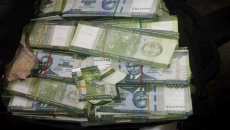PAYNESVILLE, Montserrado – About 45 minutes to 4:00 p.m. on Monday January 29, when President George Weah was expected to present his first state of the nation address, news began to spread of a significant reduction in the value of the U.S. dollars on the market.
Merchant stores and businesses in and around Monrovia immediately began refusing the US dollars, while bureaus and street money vendors also ceased to exchange US dollars for the local currency. Those who continued to accept the foreign currency did so at the rate of US$1.00 to L$100 or at even lower rates.
The low exchange rates, however, did not affect the relative high prices and costs of commodities and services; those prices remained the same.
Vendors attributed the situation to rumors and fears that Weah’s address would have ordered an immediate decrease in the value of the U.S. dollars on the market, which would affect the exchange rate.
Anthony Krah, a money exchanger in Paynesville, explained that he had received calls from other money exchangers that the president would order an immediate reduction in the exchange rate.
“I am not exchanging money [U.S. dollars] for now because I need to monitor the situation first,†Krah said.
However, Weah did not disclose any plans for such reduction in the exchange rate, as was expected, despite acknowledging in his speech that the Liberian dollar was in free fall.
“Our economy is broken, our government is broke, our currency is in free fall, inflation is rising, unemployment is at an unprecedented high, and our foreign reserves are at an all-time low,†Weah noted.
Although the president did not announce a reduction in the exchange rate, for nearly 48 hours, vendors across the country kept their exchange rate low, while most merchant stores refused to accept the US dollar.
A Lebanese merchant in Paynesville who spoke to The Bush Chicken on conditions of anonymity said he preferred taking the local currency for his goods because he was not certain what would happen in the next few days.
“The U.S. dollar currency may cause me losses if the value drops abruptly, as people are saying,†he said.
When contacted, Presidential Press Secretary Sam Mannah clarified that the reduction in the value of US dollars on the market was not the president’s doing.
“I can’t say that the change is because of the president’s speech, but we are investigating,†Mannah noted.
He said although the actual cause of the change was not known, the government was proud that such was happening under Weah’s presidency.
The buying and selling rates published on the Central Bank of Liberia’s website did not show any information for January 30; the website usually displays the rate for the current day. On January 31, it showed that there was a drop from L$128.93 on January 29 to L$121.63 on January 30 and then stabilizing at L$120.38 on January 31.
The Liberian dollar is the official currency of Liberia. However, the U.S. dollar is a legal tender in the country and is used alongside the local currency.
Meanwhile, plenary of the House of Representatives has mandated the House’s committees on Ways, Means, Finance and Development Planning; Judiciary; Banking and Currency; and Commerce and Industry to investigate businesses who allegedly refuse to accept the Liberian dollar currency toward payment of goods and services they offer. Some of the businesses being accused of the acts are BIVAC and APM Terminals.
The decision taken on Thursday to investigate the businesses followed a communication written by the representative of Bomi’s first district, Edwin Snowe. Rep. Snowe submitted a communication on Tuesday, January 30 that alleged that the institutions’ refusal to accept the local currency was contributing to the high demand for U.S. dollars currency on the market.
“I present compliments and write bringing to the attention of the August body the willful and unrealistic refusal of some business entities operating within our jurisprudence to accept the Liberian dollar as a medium of exchange,†the letter noted.
According to him, the action of the businesses has also caused exchange rate changes that are unrelated to the underlying pattern of trade as well as instability and uncertainty for struggling local businesses and consumers who trade largely in Liberian dollars.
“I pray we take the necessary appropriate actions, in the true spirit of patriotism, to end this unjust action against our citizens,†Snowe’s communication stressed.
Featured photo courtesy of Edelweiss Coins



